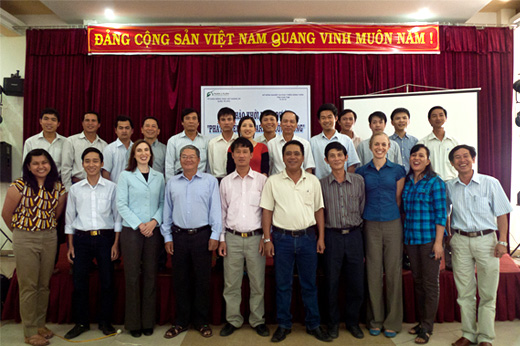Vietnam is recognized as one of the world's most biodiverse…

Lauching the REDD+ Community Carbon Pools Program in Vietnam
New regional initiative aims to share the benefits of reduced emissions from deforestation and forest degradation.
In February 2012, Fauna & Flora International (FFI) officially launched its REDD+ Community Carbon Pools program in Vietnam, which will look at the practical implementation of REDD+ (Reducing Emissions from Deforestation and Forest Degradation).
Managed by FFI in partnership with the NTFP-Exchange Program and PanNature, the program will share knowledge gained from projects in Cambodia, Indonesia, the Philippines and Vietnam in order to overcome some of the core challenges associated with REDD+.
Carbon pools: what are they, and who should benefit?
When a tree is cleared, greenhouse gases are released into the atmosphere; currently emissions from deforestation and degradation account for around 20% of global, man-made emissions.
REDD+ aims to reduce these emissions by establishing financial incentives that encourage the sustainable management of forests.
A central challenge is how to set up effective governance systems that recognize the rights of indigenous and forest-dependent communities, and ensure that the benefits (and incentives) reach these people.
FFI’s EU-supported REDD+ Community Carbon Pools program aims to address this challenge by bringing together groups from neighboring community forest areas under a common management and benefit sharing system.
Getting government agencies on-board
To launch the program, an inception workshop was held in Kon Tum Province in Vietnam’s central highlands. The workshop was attended by officials and representatives from local and national government agencies, as well as representatives from FFI and its partners.
 Attendees at the REDD+ programme workshop.
Attendees at the REDD+ programme workshop.
As this is the first REDD+ initiative in the Kon Tum province, capacity-building for communities as well as government partners will be an essential component of the program.
Linda Rosengren, FFI’s Program Manager for REDD+ in Asia-Pacific, therefore sees the workshop (which was attended by officials and representatives from local and national government agencies) as a significant milestone in implementing the program in Vietnam.
Throughout the workshop Ms Rosengren reiterated that open and positive collaboration with the government is the key to a successful implementation.
Communicating with communities and addressing livelihood challenges
Getting and sustaining community interest in the program is another major challenge.
According to Dr Len Bugayong (regional community forestry and REDD adviser for the program): “In order for a REDD+ project to prosper, all stakeholders have to understand what project participation entails – including the many benefits they will gain from protecting and sustainably managing the forests.”
“A deeper understanding of REDD+ and its risks and benefits will help the communities and local governments in deciding to pursue REDD+ at their site,” he added.
To succeed, REDD+ projects will also need to demonstrate how they can rapidly deliver benefits to the local communities that depend on forest resources for their living.
As Liem Thanh Dang, Vietnam Country Coordinator for the Program, explains: “Benefit-sharing mechanisms are still being developed. People will be asking when the revenue will come to the community, and the answer to this question will impact on their decision.”
Raising awareness within communities about biodiversity protection, environmental services and sustainable forest use are thus seen as important tasks for this three-year program.



